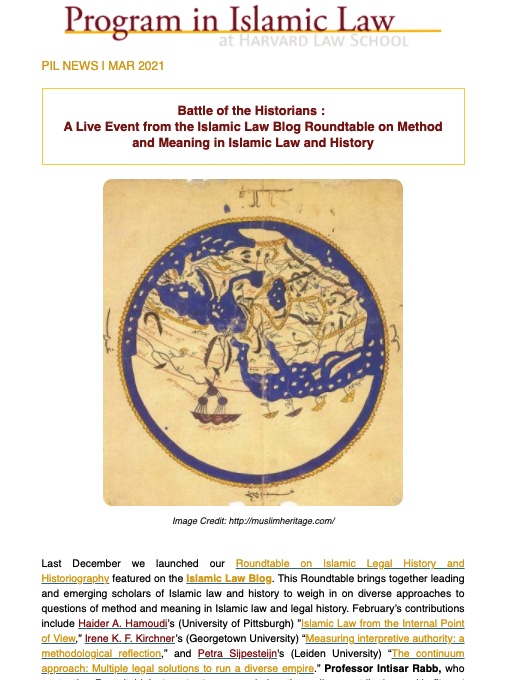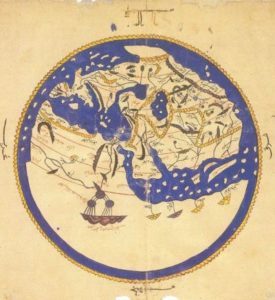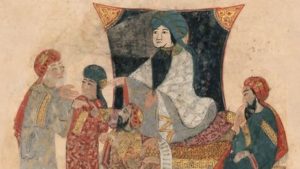
 Battle of the Historians: Last December we launched our Roundtable on Islamic Legal History and Historiography featured on the Islamic Law Blog. This Roundtable brings together leading and emerging scholars of Islamic law and history to weigh in on diverse approaches to questions of method and meaning in Islamic law and legal history. February’s contributions include Haider A. Hamoudi’s (University of Pittsburgh) ”Islamic Law from the Internal Point of View,” Irene K. F. Kirchner’s (Georgetown University) “Measuring interpretive authority: a methodological reflection,” and Petra Sijpesteijn‘s (Leiden University) “The continuum approach: Multiple legal solutions to run a diverse empire.” Professor Intisar Rabb, who wrote the Roundtable’s introduction, concludes the online contributions with “Legal Canons as Memes,” in which she proposes a conceptual and computational means of exploring Islamic legal canons (qawāʿid fiqhiyya) in a “meme pool” of legal and historical sources. From start to finish, we published 21 essays in 2021, to culminate in an online conversation featuring most of the Roundtable contributors. Register today to participate in this Friday’s Live Webinar on Islamic Legal History & Historiography (Friday, March 5th, 12:00-1:30 pm EST), where most of the contributing scholars will square off, and will reflect on larger themes, questions, and debates that emerged in the online Roundtable. All publications and events are public and open-access.
Battle of the Historians: Last December we launched our Roundtable on Islamic Legal History and Historiography featured on the Islamic Law Blog. This Roundtable brings together leading and emerging scholars of Islamic law and history to weigh in on diverse approaches to questions of method and meaning in Islamic law and legal history. February’s contributions include Haider A. Hamoudi’s (University of Pittsburgh) ”Islamic Law from the Internal Point of View,” Irene K. F. Kirchner’s (Georgetown University) “Measuring interpretive authority: a methodological reflection,” and Petra Sijpesteijn‘s (Leiden University) “The continuum approach: Multiple legal solutions to run a diverse empire.” Professor Intisar Rabb, who wrote the Roundtable’s introduction, concludes the online contributions with “Legal Canons as Memes,” in which she proposes a conceptual and computational means of exploring Islamic legal canons (qawāʿid fiqhiyya) in a “meme pool” of legal and historical sources. From start to finish, we published 21 essays in 2021, to culminate in an online conversation featuring most of the Roundtable contributors. Register today to participate in this Friday’s Live Webinar on Islamic Legal History & Historiography (Friday, March 5th, 12:00-1:30 pm EST), where most of the contributing scholars will square off, and will reflect on larger themes, questions, and debates that emerged in the online Roundtable. All publications and events are public and open-access.
 CONTENT: Online Companion to Justice and Leadership in Early Islamic Courts (first published by HUP 2019) One aim of SHARIAsource is to provide access to primary and secondary sources of Islamic law to support research on salient issues of Islamic law and history. Our latest feature on the SHARIAsource portal is the new Online Companion to Justice and Leadership in Early Islamic Courts, edited by Professor Intisar Rabb (Harvard University) and Professor Abigail Balbale (New York University)—providing online access to and primary source snippets of the 2019 print volume. This companion serves as a resource for readers interested in deeper exploration of the sources underlying the administration of justice during Islam’s founding period, 632–1250CE. It includes chapters by ten leading scholars of Islamic law and over 130 diverse sources that illuminate a broader and deeper vision of law and society than traditional legal literature alone can provide, including historical chronicles, biographical dictionaries, legal canons, and exegetical works. overturned.
CONTENT: Online Companion to Justice and Leadership in Early Islamic Courts (first published by HUP 2019) One aim of SHARIAsource is to provide access to primary and secondary sources of Islamic law to support research on salient issues of Islamic law and history. Our latest feature on the SHARIAsource portal is the new Online Companion to Justice and Leadership in Early Islamic Courts, edited by Professor Intisar Rabb (Harvard University) and Professor Abigail Balbale (New York University)—providing online access to and primary source snippets of the 2019 print volume. This companion serves as a resource for readers interested in deeper exploration of the sources underlying the administration of justice during Islam’s founding period, 632–1250CE. It includes chapters by ten leading scholars of Islamic law and over 130 diverse sources that illuminate a broader and deeper vision of law and society than traditional legal literature alone can provide, including historical chronicles, biographical dictionaries, legal canons, and exegetical works. overturned.
 CONTEXT: Islamic Legal Genres: Genre as a Tool for Understanding Islamic Law
CONTEXT: Islamic Legal Genres: Genre as a Tool for Understanding Islamic LawThrough Monthly Lectures on Islamic Legal Genres, convened by Intisar Rabb, Hakki Arslan, and Necmettin Kizilkaya, a working group of scholars explore definitions and functions of popular genres in Islamic law from the 14th to 19th centuries. The group hypothesizes that the development of different genres accompanied different functions and diversity of content to match the evolving needs of Islamic law and society. Last month, Professor Mohammad Fadel (University of Toronto) presented “Form, Function and Historical Development of Mukthasars in Post-Mamluk Islamic Law.” His presentation aimed to identify the historical relationship of the mukhtasar to its literary predecessors and sociological functions. His presentation followed Professor Murteza Bedir’s (Istanbul University), on “Form, Function and Historical Development of Uṣūl al-fiqh as a Genre.” Subscribe to our lists for the latest on this ongoing workshop.
See the full newsletter.

